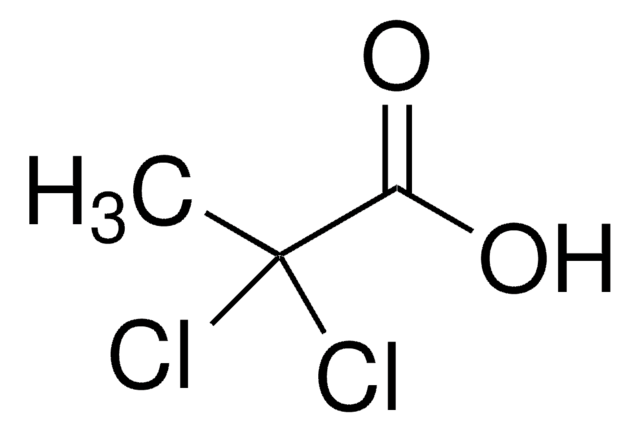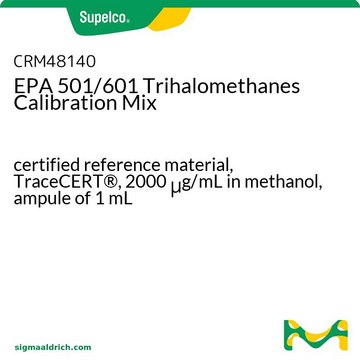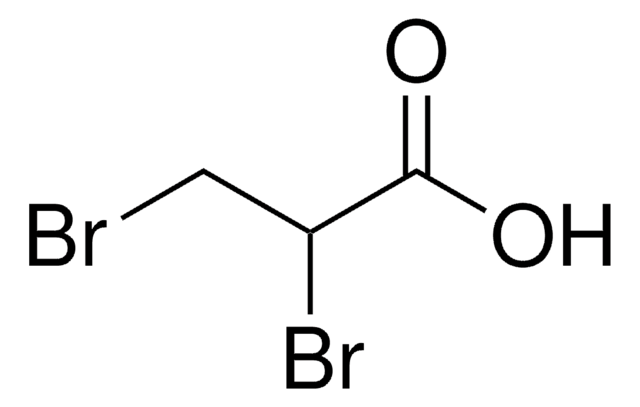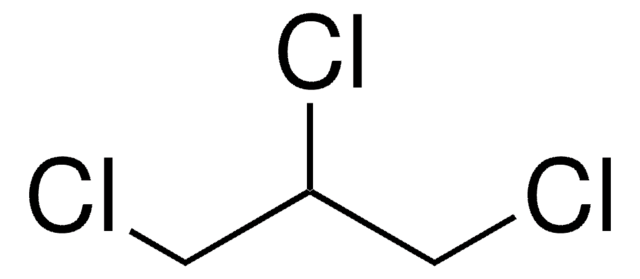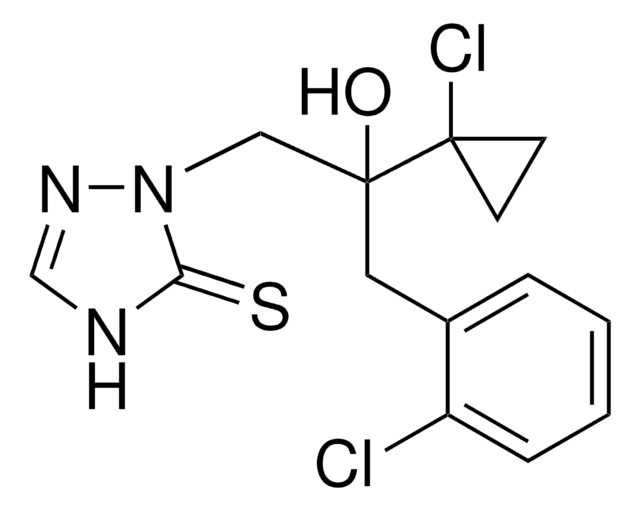49107-U
552.2 Haloacetic Acids Mix
certified reference material, 2000 μg/mL each component in methyl tert-butyl ether
Autenticatiper visualizzare i prezzi riservati alla tua organizzazione & contrattuali
About This Item
Codice UNSPSC:
77101502
NACRES:
NA.24
Prodotti consigliati
Grado
certified reference material
TraceCERT®
agenzia
EPA 552.2
Nome Commerciale
TraceCERT®
CdA
current certificate can be downloaded
Caratteristiche
standard type calibration
Confezionamento
ampule of 1 mL
Concentrazione
2000 μg/mL each component in methyl tert-butyl ether
tecniche
HPLC: suitable
gas chromatography (GC): suitable
applicazioni
environmental
Formato
multi-component solution
Temperatura di conservazione
2-8°C
Descrizione generale
EPA 552.2 Haloacetic Acids Mix is a multi-component solution containing bromoacetic acid, bromochloroacetic acid, bromodichloroacetic acid, chloroacetic acid, dibromochloroacetic acid, dibromoacetic acid, dichloroacetic acid, tribromoacetic acid, and trichloroacetic acid as certified reference materials (CRMs). The raw materials and solvents used in the preparation of EPA 552.2 Haloacetic Acids Mix have been screened for identity and purity. The mixture is gravimetrically prepared and quantitatively analyzed by gas chromatography (GC).
US EPA 500 Series methods are analytical methods for identifying and quantifying organic contaminants such as volatile organic compounds (VOCs), pesticides, synthetic organic compounds (SOCs), and trihalomethane disinfection byproducts (THMs) in raw source water, finished drinking water, and drinking water at all stages of treatment.
US EPA 500 Series methods are analytical methods for identifying and quantifying organic contaminants such as volatile organic compounds (VOCs), pesticides, synthetic organic compounds (SOCs), and trihalomethane disinfection byproducts (THMs) in raw source water, finished drinking water, and drinking water at all stages of treatment.
Applicazioni
EPA Method 552.2 Haloacetic Acids Mix is used as a CRM to quantify halogenated carbonaceous disinfection by-products (C-DBPs) in drinking water, tap water, treated water, and wastewater samples by gas chromatography (GC) based techniques.
Refer to the product′s Certificate of Analysis for more information on a suitable instrument technique. Contact Technical Service for further support.
Altre note
This Certified Reference Material (CRM) is produced and certified in accordance with ISO 17034 and ISO/IEC 17025. All information regarding the use of this CRM can be found on the certificate of analysis.
Note legali
TraceCERT is a registered trademark of Merck KGaA, Darmstadt, Germany
Analita
Descrizione
Bromoacetic acid
Bromochloroacetic acid
Bromodichloroacetic acid
Chloroacetic acid
Dibromochloroacetic acid
Dibromoacetic acid
Dichloroacetic acid
Tribromoacetic acid
Trichloroacetic acid
Vedi tutto (9)
Avvertenze
Danger
Indicazioni di pericolo
Consigli di prudenza
Classi di pericolo
Flam. Liq. 2 - Skin Irrit. 2
Codice della classe di stoccaggio
3 - Flammable liquids
Classe di pericolosità dell'acqua (WGK)
WGK 3
Punto d’infiammabilità (°F)
-27.4 °F - closed cup
Punto d’infiammabilità (°C)
-33.0 °C - closed cup
Dispositivi di protezione individuale
Eyeshields, Gloves
Scegli una delle versioni più recenti:
Possiedi già questo prodotto?
I documenti relativi ai prodotti acquistati recentemente sono disponibili nell’Archivio dei documenti.
Degradation of haloacetic acids with the Fenton-like and analysis by GC-MS: use of bioassays for monitoring of genotoxic, mutagenic and cytotoxic effects
Mour?o AO, et al.
Environmental Monitoring and Assessment, 191(8), 513-513 (2019)
Amanda Oliveira Mourão et al.
Environmental monitoring and assessment, 191(8), 513-513 (2019-07-28)
In this study, a method was developed to evaluate the degradation of haloacetic acids (HAAs) in water by a heterogenous Fenton-like process catalyzed by cobalt-doped magnetite nanoparticles (Fe3 - xCoxO4), extraction of the contaminants by liquid-liquid extraction (LLE), and analysis
Huihui Han et al.
Journal of environmental sciences (China), 65, 335-346 (2018-03-20)
Disinfection byproduct (DBP) precursors in wastewater during the reversed anaerobic-anoxic-oxic (A2/O) process, as well as their molecular weight (MW) and polarity-based fractions, were characterized with UV scanning, fluorescence excitation emission matrix, Fourier transform infrared and nuclear magnetic resonance spectroscopy. Their
Il team dei nostri ricercatori vanta grande esperienza in tutte le aree della ricerca quali Life Science, scienza dei materiali, sintesi chimica, cromatografia, discipline analitiche, ecc..
Contatta l'Assistenza Tecnica.
